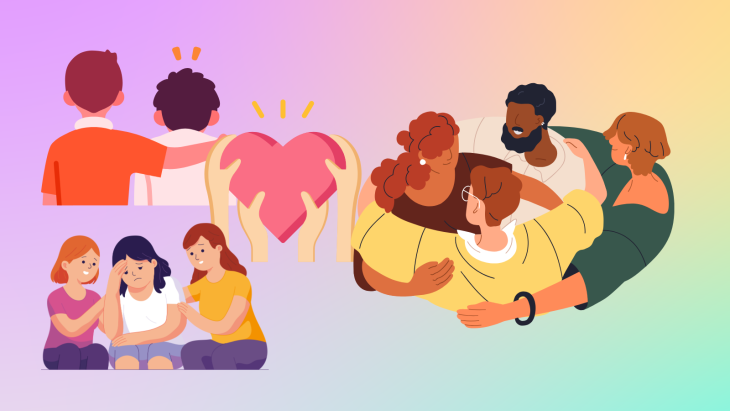Recent Posts
- The Anxious Generation. What is causing Gen Z's mental health crisis?
- Do you have to play games to make relationships work?
- Can a Therapist Find love? The Dating Life of a Therapist.
- Can a Therapist Benefit from Therapy?
- My kid's schedule is fully packed with after-school activities everyday. How much is too much?
Most Popular
If there is one thing I want to work on myself, it would be showing more empathy. What is empathy in action?

When a close friend discloses to us a hard time they are going through, are we quick to pat them on the shoulder and offer our advice? Or is it easy for us to point out to them the silver lining, and say, “At least…” and something they should be grateful for instead.
Often, people close to us who are in dire situations open up to us, not really because they want us to solve the problem or make them feel better, but they just want to feel connected, to feel that they are not alone.
You may have been on the receiving end of people’s well-meaning advice, but what you really craved was to feel understood, and to feel that someone is there for you.
Choosing to be more empathetic means making the world a better place by adding compassion in our emotions, words, thoughts, and actions. The good news is when we choose empathy, we can improve on it with practice!
Why should we strive for empathy?
- It is a tool we can use to develop strong relationships.
- It is a predictor of success, both personal and professional.
- It improves our mental wellbeing.
Understanding empathy
Based on our reactions to situations, empathy happens in and affects three major areas.
- Our mind. Cognitive empathy is our mind’s ability to understand a person’s point of view, their thoughts and their feelings. We might not have been in the same situation as the other person, but we can use our knowledge, past experiences and point of view to anticipate the other person’s situation. It is making an educated guess that allows us to put ourselves in a situation that we have not gone through before ourselves.
- Our emotions. In emotive empathy, we are able to feel another person’s emotions along with them. If they are in pain, we also feel the pain. Emotive empathy goes beyond our cognition. Biologically, humans have the capacity to “mirror” other people’s feelings because of the action of mirror neurons in our brain. At times, feeling other people’s emotions come naturally, but part of it is also a choice.
- Our actions. Lasty, emphatic empathy happens when our mind and emotions move us to take action. In this stage, we are compelled to extend a helping hand, in ways that the other person wants us to help.
Now that we understand the three areas where empathy can take place, we can ask ourselves where we usually struggle with. Are we good at understanding a person’s perspective, but we find it hard to feel how they feel? Or we feel we are able to walk in their shoes and feel their feelings, but we don’t know how to express our empathy in actions?
Regardless of where you want to improve, saying yes to developing your empathy is a move in the right direction.
Growing in empathy through emotions, thoughts, and actions
- Go beyond cognitive empathy. Empathy starts with being open to other people’s perspectives, and practicing non-judgmental and active listening. Allowing the person to share without our judgment makes them feel welcome and respected. However, most of us struggle with emotions. Big feelings can be scary. Many of us have not been taught how to manage feelings, and we would rather suppress or help others suppress them. We can practice listening to these feelings and affirm that the feelings are real. Accept the presence of these feelings.
- Ask the person what they need. Sometimes, we tend to do too much by sharing our own personal experiences, offering our two cents, and proposing solutions. First, recognize the situation and ask the person, “What do you need at this time?” or “What help do you need?” If you feel you have some solutions in mind, give your ideas to them as suggestions and options to choose from and not as the only solution. If they say they need someone to listen to them, then just be there for them. Your presence and listening ear are enough.
- Acknowledge their vulnerability and boost their confidence. Opening up a difficult situation takes a lot of courage. Thank them for it and reaffirm that they can trust you to keep things private.
As they share, you might see in them positive characteristics like courage despite fears, and strength during hard times. Tell them that they are showing these admirable traits to remind them that they have the capacity to overcome.
The beautiful thing about empathy is that it is already in us. It just needs to be fine tuned. Our good intentions are already there, but we can still improve on how we show it in our words, thoughts, emotions and actions. See how your relationships undergo positive change as you become more empathetic!
Discover the next healthcare and mental health profession jobs suited for your skills and qualifications by connecting to America’s leading medical job board!








Comments